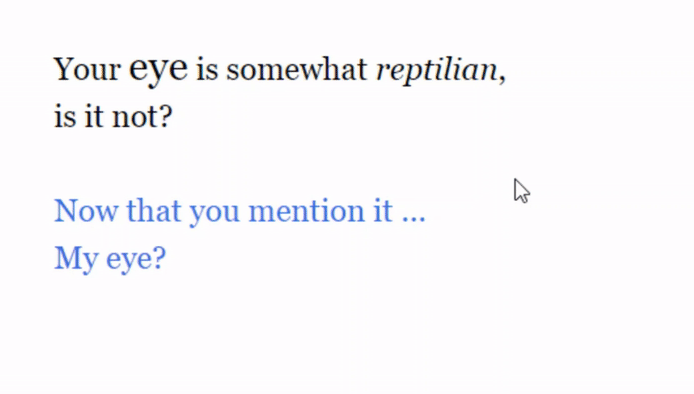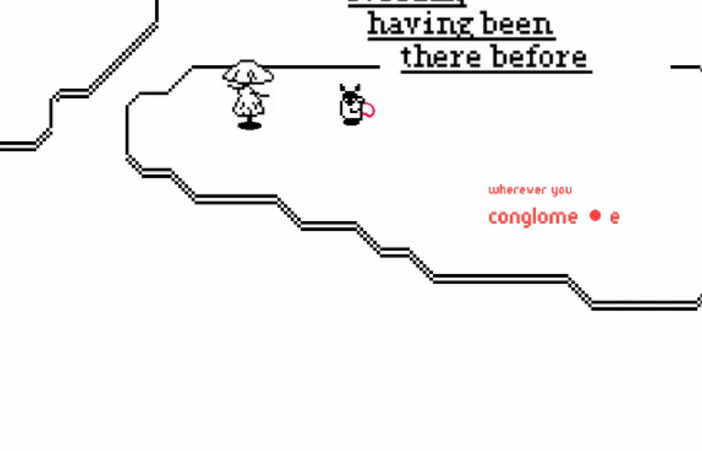
Ludokinetic poetry is poetry which implicates the reader in the text, which imbues in them a sense of responsibility for an outcome of or within the text. It accomplishes this by letting them pilot it in some way, by presenting them with choices that appear to impact events depicted within the poem, or aspects of its representational burden. A ludokinetic poem acknowledges the reader’s presence, and recruits them to finish what the writer started.
It’s not the same thing as a digital poem. Although a digital interface is one of the obvious ways of making participation possible, a ludokinetic poem could also take the form of a card game, or a printed list of items from which the reader is asked to make a selection. As a form, it’s very closely related to games and interactive fiction. Whereas interactive fiction usually takes place in a literal ‘other’ world, however, the world of a ludokinetic poem is likely to be figurative, a subjective representation of some aspect of experience.
Here is a bare-bones example. Click on the glitching words below to ‘travel’ to different parts of an underwater wreck. There’s nothing to win, no wrong or right choice, and nothing especially complex about the way you interact with the poem. But by moving from location to location (or stanza to stanza), you embody the role of diver in a poem which, like Adrienne Rich’s ‘Diving into the Wreck’, is really an extended metaphor.
But why?
It’s always seemed to me that there’s too much distance between reading, writing and playing, and that these pursuits ought to be thought of as extensions (or dimensions) of one another. All are modes of discovery, but while the poem makes a central figure of the poet, the videogame (and the game more generally) makes a central figure of the player. The reader is somewhat lost in the middle, assumed to be a receptacle for entertainment or education, while the poet and the player engage in a contest as to who gets to work the levers and actually produce cultural meaning. That is to say, there is friction between the idea that poets – leaderly, insightful figures – light the way through the darkness, and, on the other hand, that our social reality is shaped by players – each individual acting according to their immediate desires.
The poem is thereby placed in opposition to the game – one as an emblem of an enlightened but conservative, hierarchical society, one as an emblem of hedonism, anarchy and tribalistic jostling. But the kind of society I believe in is one of flux, productive exchange and deep involvement in one another, and in that kind of society the reader has as much input into the meaning of a text as the poet or the player. All are working in concert. Forms that blur the distinctions between these roles are therefore a very attractive prospect.
I talk about ludokinetic poetry, as well as other kinds of poem-game crossover, in Dual Wield: The Interplay of Poetry and Video Games. What I want to do here, now I’ve outlined the basic concept, is give a quick history of how I arrived at the term.
Making hybrids
In the mid-2000s, my long-term collaborator Kirsten Irving and I began a series of projects that were designed to narrow the gap between games and poems. First, we printed Dr Fulminare’s Bard Games, a mini-zine of poems which borrowed the rules of board games as the basis for their formal structure (poems as domino games, as jenga towers, as rounds of battleships). Then we moved onto poems that imported ideas and content from video games (think ‘Ode on a Grecian Urn’ but on Donkey Kong Country Returns). We invited submissions of such poems for two anthologies: Coin Opera and its much larger, crowd-funded sequel, Coin Opera 2: Fulminare’s Revenge, the latter of which included work by many UK poets who would go on to be feted.
(As a bonus booklet for early purchasers, I also wrote, designed and printed Super Treasure Arcade, a set of micro-poems, each based on a single game released in a particular year, starting from 1971.)
These experiments operated on the basis that adapting game material for use in literary works established a system of exchange, and a kinship – though I was still struggling to put my finger on exactly what this meant when I spoke about the subject briefly in an interview with Georgia Mann on BBC Radio 4 in 2016:
By then, we had begun to think in terms of the emergent quality of video games (that is, the sense that events are unfolding live and unscripted before your eyes). How could that be made a feature of written poems? We experimented with two-player collaborative-competitive poems, where a pair of poets vie for control, each operating under a separate constraint. We also started playing around with procedural generation. Another short pamphlet, Core Samples, used javascript to randomise the content of poems in the same way virtual terrain is generated in games like Minecraft, while an earlier experiment, Pantoum, retrod the ground of Queneau’s Cent mille milliards de poèmes, but as a digital text.
The question we started to ask ourselves was: what transforms a reader into a player?
Playable poems
Loss Pequeño Glazier describes the process of poetry’s expansion into digital-interactive space as extending “the physicality of reading”. That is to say, it is an experiential augmentation; readers become physically involved in shaping and moving through the poem, beyond the point of holding a book and turning the page. The more they have to do, the more dedicated they become to pursuing an outcome. We began dabbling in this area by creating digital versions of ordinary print poems broken up into stages, including Doomdark’s Revenge by Kate Potts, which we had previously published in Coin Opera 2.
This was released as part of a series of ‘play-poems’ produced in Twine, an online tool for writing interactive texts. We played around with slide presentation software to similar effect; this fusion of two of my own poems, Meat and Mustard, uses a free CSS resource called impress.js. (Meat in particular seemed to lend itself to interactive adaptation, since each line has within it a hidden word).
But these examples were missing something fundamental. As I embarked on my PhD research project, which was focussed on poem-game interplay, I began to formulate a theory of ludicity (or ‘game-ness’) that centred on responsibility; that is, a game implicates a player, rather than merely enabling them. Thus far we had struggled to cross into this territory, though one of our light-hearted play-poem constructions, Shag versus Cormorant, had touched on it by rewarding the reader with one of two different poems (and an accompanying illustration) depending on their responses to a range of questions.

Simple roleplay in Shag versus Cormorant.
The term ‘ludokinetic poem’ suggested itself to me when, as part of my research, I found I wanted to identify a new type of interactive poem, distinct from those that gave the reader no role to play, no persona that was integrated to the text. A ludokinetic poem, I decided, should in some way recognise that the reader is present. It should imply or directly state that they are an actor within the world of the poem.
One of the works I developed as a test case was Dicecave, which I included at the top of this page. It draws inspiration from both Colossal Cave Adventure (1976), one of the first text adventure games and the precursor to the modern adventure game genre, and Mallarmé’s Un coup de dés jamais n’abolira le hasard (A Roll of the Dice Will Never Abolish Chance) (1897), an early modernist poem which anticipated free verse and concrete poetry.
Poetry Games and Intertextual Mutation
A ludokinetic poem is literature first and foremost – literature with gameplay embedded. But a poem-game hybrid might equally be a game first and foremost. ‘Poetry games’, as I envisage them, incorporate poetry as a major building block in a game-world – not necessarily as a directly interactive element, but certainly as a principle component of the game’s internal system of meaning. At the time of writing, I have only made very minor forays into this territory.

Short clip from Erratum, a work in progress.
Meanwhile, I use a more convoluted term – ‘ludo-poetic intertextual mutation’ – to describe games that play around with existing poems, and poems that play around with existing games, recycling or remarking on their content in order to expand on or re-make their meaning. Not ludokinetic, then, but a closely related area that could end up becoming even more expansive. See Calum Rodger’s ‘Rock, Star, North’, a 20-minute poetic travelogue set inside the world of Grand Theft Auto V, or one of my own efforts, ‘The Lookout’, performed in the video below by Guy Clark. This poem was rooted in the experience of playing as a thief in the 2014 game Monaco: What’s Yours is Mine, but in the process of writing both character and the setting were substantially changed.
Guy Clark performs ‘The Lookout’ for Live Canon.
The Sticking Point
The cultural separation of poetry from games remains stark. I would argue that it is representative of the cultural separation of meaning from pleasure, and of purpose from play. Liam Murray and John Maher write compellingly on the devaluation of fantasy in digital game properties, where it is often divorced from its political and psychological function and offered as pure escapism. Video games in particular are viewed, by vocal sections of both fans and critics, as glorious nonsense, free of application to the real world.
At the same time, mainstream literary culture sidelines – or side-eyes, perhaps, more accurately – fantasy and play, deeming it a distraction from the serious pursuit of truth. Murray and Maher have an apt term for that property of games and other popular media which makes traditional critics queasy: “scurrility ... that which is demeaned, impoverished, hidden, secret and guilty.”
This is a sad state of affairs. These two realms – that of making sense, and of exciting the senses – are inevitably interwoven. Moreover, serious literature’s retreat from fantasy leaves a vast imaginative realm to be plundered by primarily commercial and hobbyist interests, where the desire is to avoid reality rather than find ways of addressing it. Traffic between literature and games exists, and has always existed, but the resistance to it is stifling.
I therefore make the case for ludokinetic poetry and other forms of game-poem hybridity as an opportunity for growth in both mediums. There is great potential for a doubling up of the power both poetry and gameplay possess to cause us to reorientate ourselves, to make ourselves pliant and nimble – able to rethink the constrictions of place and identity that are imposed upon us.
— J.S. (May, 2020)
Poems
℘
The
Amalgamist’sWorkshop
℘
What is
Ludokinetic
Poetry?
℘
Sandsnarl
℘
Unravelanche
℘
School
of Forgery
℘
Dual Wield
℘
The Hipflask
Series
℘
Whispering
Leaves
℘
Adversary
℘
Headbooks
℘
Scarecrows
℘
Hybardrids
℘
Tomboys
℘
Birdbooks
℘
Super Treasure
Arcade
℘
Death Daydream
Season
℘
Sidekick Books
℘
Core Samples
℘
Riotous
℘
Superminis
℘
The
Mechamorphoses
℘
site by jon